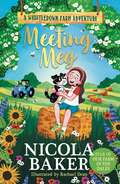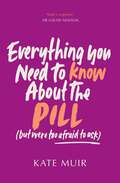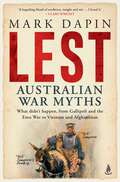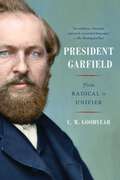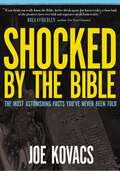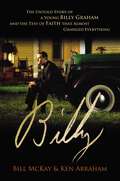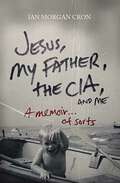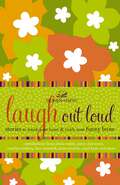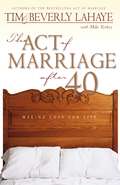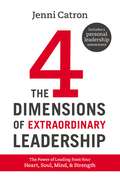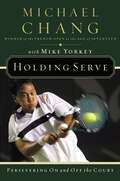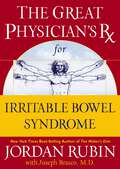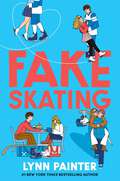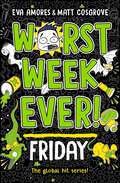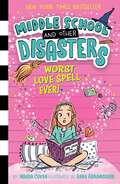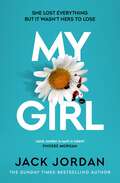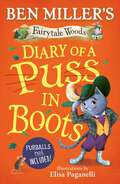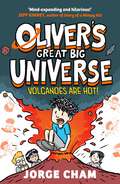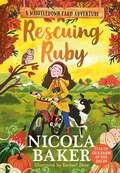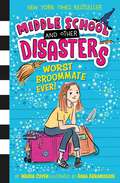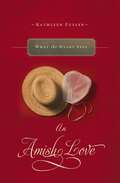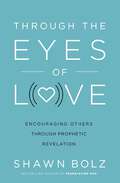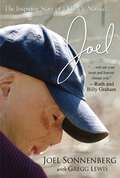- Table View
- List View
Meeting Meg (A Whistledown Farm Adventure #3)
by Nicola BakerThe third book in a warm and beautifully observed farm adventure series from Nicola Baker, star of Our Farm in the Dales. Perfect for readers 8+ and fans of Jacqueline Wilson, Michael Morpurgo, Dick King Smith and The Snow Foal. With stunning illustrations from Rachael Dean throughout. It's summer at Whistledown Farm and there's plenty for Ava to do – from helping to shear the sheep to baling the hay. But then she meets a litter of border collie pups and suddenly the sunny days get a lot more complicated . . . &‘Baker is a gifted writer, and her bucolic adventure harks back to classic farm stories such as those written by Dick King Smith and Michael Morpurgo&’ The BooksellerAbout the author: Growing up, Nicola spent hours with her nose stuck in a book or filling notebooks with stories and sketches. After a successful career as a physiotherapist and raising two children she&’s now come full circle and is writing again. Nicola lives on a smallholding with her husband and two children. When she&’s not mucking out chickens or feeding the sheep you&’ll find her writing adventure stories for children.
Everything You Need to Know About the Pill (but were too afraid to ask)
by Kate MuirAn eye-opening, no-holds-barred guide to contraception, written by campaigner, journalist and documentary-maker Kate MuirEverything You Need to Know About the Pill (but were too afraid to ask) is the thinking-woman&’s guide to contraception, bringing you answers to all those questions that have been hidden behind a veneer of misplaced shame, bad science and centuries of patriarchy. What's happening to my body - and my mind? Which method of contraception is best for me? Do I really need to take a pill break every three weeks? What about men - where's their pill?! Muir draws on interviews with the leading medical experts in the field, interlaced with her own tumultuous journey with different types of contraception and the personal stories of women from all walks of life, sharing their varied experiences and hard-earned wisdom. Muir also questions why the current medical establishment is getting contraception so wrong, as she debunks the myths and exposes the sloppy science and hysterical headlines that have had a negative impact on women&’s health for the last twenty years. This ground-breaking guide is a social, cultural and scientific exploration into a criminally overlooked and under-discussed part of women's lives. It is a manifesto for change, calling for equality in healthcare and an entirely new - and long overdue - approach to women&’s health. _________________ *Praise for Everything You Need to Know About the Menopause (But Were Too Afraid to Ask):* &‘I have huge respect for Kate. A forensic journalist and menopause warrior&’ - Davina McCall &‘The research Kate has done is phenomenal and so impressive. Everyone needs a copy of this book on their bookshelves!&’ - Dr Louise Newson
Storm Seal: A seaside story of family and hope
by Sarah Ann JuckesFind your voice in the waves in a heartfelt and hopeful story of family, friendship, and learning to accept change from the critically-acclaimed partnership, Sarah Ann Juckes and Sharon King-Chai, selected for Waterstones Children's Book of the Month with The Night Animals. Martha was raised on her nana&’s stories. Even if no one else believes them, Martha knows that they&’re magic. Now those stories are helping Martha hold things together when everything around her is falling apart – out-of-towners moving into her family&’s old house, her nana&’s mysterious illness, and the tourists flooding the town who don&’t seem to care about the sea or the animals it&’s home to. But Martha has found one creature who understands – a black seal pup that seems to appear whenever Martha needs it most. Could she be the key to fixing everything that's wrong, or will Martha need to fight her way through the storm herself? Illustrated by the award-winning Sharon King-Chai, Sarah Ann Juckes&’ emotional novel follows a young girl trying to protect her family and her community, who must learn that not all changes are bad. For fans of The Last Bear and Julia and the Shark.Praise for Sarah Ann Juckes &‘Will break your heart and mend it together again&’ ― Piers Torday on The Hunt for the Nightingale &‘Full of hope, beauty & ultimately a healing song to nature&’ ― Hannah Gold on The Hunt for the Nightingale &‘An incredibly moving story of feeling lost and finding your way again&’ ― Lisa Thompson on The Hunt for the Nightingale 'An iridescent story that shines with hope and love' ― Katya Balen on The Night Animals 'A beautiful story about ghosts, friendship, and the courage it takes to ask for help' ― Emma Carroll on The Night Animals
Lest: Australian War Myths
by Mark DapinFrom Simpson&’s donkey and the Emu War to Vietnam and Ben Roberts-Smith, Australian military history is full of events that didn&’t happen the way most people think they did. In his inimitable style, award-winning author Mark Dapin sets the record straight. Australia has many stories and statues &‘lest we forget&’ our military past. But from Simpson&’s donkey to Ben Roberts-Smith, our history is full of events that didn&’t happen the way most people think they did. The first Anzac Day, for example, was far from being a solemn march – it was a celebration where people dressed as cavemen and dinosaurs, among other things. And is it true that British officers callously dispatched Australian soldiers to their deaths in the Dardanelles, as we&’ve been told? Did we really hate the soldiers returning from Vietnam? Were the white-feather women of the First World War fact or fiction? In his inimitable style, award-winning author and historian Mark Dapin sets the record straight, showing that the reality was often completely different from the myth – and that in celebrating the wrong people we often overlook the real heroes. &‘With Lest, Mark Dapin transforms his trademark humour into serious history … It forces us to look again at stories we think we all know – or should know – and reframe them with intellectual rectitude and rigour … Lest offers new perspectives on the past from one of Australia&’s most interesting and provocative thinkers.&’ Clare Wright
President Garfield: From Radical to Unifier
by CW GoodyearAn &“ambitious, thorough, supremely researched&” (The Washington Post) biography of the extraordinary, tragic life of America&’s twentieth president—James Garfield.In &“the most comprehensive Garfield biography in almost fifty years&” (The Wall Street Journal), C.W. Goodyear charts the life and times of one of the most remarkable Americans ever to win the Presidency. Progressive firebrand and conservative compromiser; Union war hero and founder of the first Department of Education; Supreme Court attorney and abolitionist preacher; mathematician and canalman; crooked election-fixed and clean-government champion; Congressional chieftain and gentleman-farmer; the last president to be born in a log cabin; the second to be assassinated. James Abram Garfield was all these things and more. Over nearly two decades in Congress during a polarized era—Reconstruction and the Gilded Age—Garfield served as a peacemaker in a Republican Party and America defined by divisions. He was elected to overcome them. He was killed while trying to do so. President Garfield is American history at its finest. It is about an impoverished boy working his way from the frontier to the Presidency; a progressive statesman, trying to raise a more righteous, peaceful Republic out of the ashes of civil war; the tragically imperfect course of that reformation, and the man himself; a martyr-President, whose death succeeded in nudging the country back to cleaner, calmer politics.
Shocked by the Bible: The Most Astonishing Facts You've Never Been Told
by Joe KovacsShocked by the Bible sets the record straight with well-researched, controversial, myth-breaking assertions about what the Bible really does—and doesn&’t—say.And guess on which day the Bible says Jesus died. Believe it or not, the Good Book doesn't mention Friday, and even more surprisingly, while the Bible says Jesus rose from the grave, it does not say it occurred Sunday morning. Remember, Jesus' followers found an empty tomb then.But don't feel bad if you've always assumed otherwise. Like countless millions of people, you've just been misinformed, misled or even (dare we say) lied to about what the Bible actually says.In a stunning investigation, news veteran Joe Kovacs goes on a mission to help both Christians and non-Christians alike find out what the Bible really contains, and what it doesn't."Shocked by the Bible: The Most Astonishing Facts You've Never Been Told" is an educational juggernaut that relies solely on the Holy Bible to reveal hundreds of Scriptural facts that many people of all persuasions simply don't know. The book instantly skyrocketed to the No. 1 position in three Bible-related categories on Amazon.com."I'm among the biggest fans of the Bible of all time," says Kovacs. "My goal is to educate people about the solid truth of Scripture and to stop the spread of erroneous information. I want people to crack open their Bibles and see with their own eyes what's actually printed on the pages, and what's not. It's shocking!"According to Scripture, you won't find "Three Wise Men" mentioned anywhere in the story of Jesus' birth. For that matter, none are said to have shown up at the manger in Bethlehem. The truth straight from your own Bible is that an unspecified number of wise men first met Jesus as a "young child" in a "house," not a babe in a manger, and it might have been more than a year after He was born. Go ahead, look it up for yourself.Also, according to Scripture, you won't find a single mention of Easter eggs, but you will find God warning His people not to have anything to do with a pagan fertility goddess, whose name is synonymous with "Easter.""Yes, I'm a Bible-believing Christian," says Kovacs. "But I'm not here to convert anyone. People are free to believe whatever they wish and can come to their own conclusions. I just want to show them the biblical record is often very different from what many assume. Not only will Christians love this book, but I think Jews, Muslims and even agnostics and atheists will get a kick out of it as well."
I Said Yes: My Story of Heartbreak, Redemption, and True Love
by Emily Maynard JohnsonNEW YORK TIMES BESTSELLERMillions know Emily Maynard Johnson from her appearances on both The Bachelor and The Bachelorette. At the end of a long, fruitless search for a husband, Emily found that waiting right in front of her all along was the truest love of all: the unconditional love of the Lord. Overcome with embarrassment following her nationally televised heartbreaks, Emily finally committed herself to the only one she knew would never leave her empty and alone. Abandoning her need to be chosen by men and finding peace in the fact that she was already chosen by God, Emily found the joy she had been looking for in serving God.I Said Yes chronicles Emily's experiences on both The Bachelor and The Bachelorette and the way that God turned her life upside down through the knowledge and acceptance of His true love.As Emily sheds light on her life as a believer in the spotlight, she teaches us:How to embrace the gift of true redemptionWhat it means to fully surrender your heart to GodHow to say yes to God's ways, God's love, and God's timing In I Said Yes, Emily tells the story of her life before and after reality TV fame, describing the profound new reality she discovered when she traded fame in favor of the Lord--and to that unconditional love, Emily said yes.
Billy: The Untold Story of a Young Billy Graham and the Test of Faith that Almost Changed Everything (Playaway Adult Nonfiction Ser.)
by Ken Abraham William Paul McKayThe remarkable true story of a young Billy Graham and his best friend who walked away from the faith. We all know how the story ends but how did it begin? Before he became a household name, and America's Pastor, he was simply known as Billy. When he wasn't playing baseball, he was discovering his love for Christian ministry. His best friend, Charles Templeton, was already on track to be a highly successful evangelist and the two young men began strategizing on how to win the world for Christ. That plan takes a drastic turn, however, when Templeton deserts the faith and becomes an atheist. The impact of this decision on a young Billy Graham is immeasurable and agonizing. Charles would later become the great intellectual architect for agnosticism and atheism. Billy would become the single greatest messenger for the Christian Gospel. It is one of the great untold dramas between friends - Atheism vs Christianity, betrayal and hope.
Jesus, My Father, The CIA, and Me: A Memoir. . . of Sorts
by Ian Morgan CronA touching memoir of life with an alcoholic father who secretly works with the CIA, a dark pilgrimage through the valley of depression and addiction, and finding a faith to redeem and a strength to forgive."This is a record of my life as I remember it—but more importantly, as I felt it."At the age of sixteen, Ian Morgan Cron was told by his mother that his father, a motion picture executive, worked with the CIA in Europe. This astonishing revelation, coupled with his father's dark struggle with alcoholism, upended the world of a teenager struggling to become a man.Born into a family of privilege and power, Ian's life is populated with colorful people and stories as his father takes the family on a wild roller-coaster ride through wealth and poverty and back again.Decades later, as he faced his own personal demons, Ian realized that the only way to find peace was to voyage back through a painful childhood marked by extremes—privilege and poverty, violence and tenderness, truth and deceit—that he&’d spent years trying to escape.A fast-paced, unique memoir about the power of forgiveness from the bestselling author of The Road Back to YouDetails his father&’s struggle with alcohol and Cron&’s own journey from addiction to twenty-three years of sobrietyEncouragement to see God&’s redemptive power through life&’s strugglesIn this surprisingly funny and forgiving memoir, Ian reminds us that no matter how different the pieces may be, in the end we are all cut from the same cloth, stitched by faith into an exquisite quilt of grace.
Laugh out Loud: Stories to Touch Your Heart and Tickle Your Funny Bone
by Women of FaithCouldn&’t we all use a good laugh?Whether you&’re running full-speed-ahead or disappointed that it&’s Monday (again), you&’ll find joy in these pages where women—and a few men—share their hilarious stories and insights on daily life. Pets, potlucks, husbands, hot flashes, typos, tykes...This world can be a funny place, and these stories are bound to prove it. Read a chapter to brighten your morning, or catch a few words to make you smile before bed. There&’s never a bad time for a good laugh, and Laugh Out Loud is..
The Act of Marriage After 40: Making Love for Life
by Mike Yorkey Beverly LaHaye Tim LaHayeYes, lovemaking does change after 40, but it is still the most thrilling experience two married people of the opposite sex can experience on this earth! In this practical, fun-to-read, illustrated guidebook, Tim and Beverly LaHaye cover a broad spectrum of key topics and show married couples how to experience a more satisfying and joy-filled sex life long after age 40.Millions of married couples have questions about sexual intimacy. Yet all too often, their questions go unasked . . . or unanswered. This easy-reading, medically sound book candidly addresses issues of intimacy:Does sexual desire actually reverse with aging?How does menopause affect a woman's sex drive?How can exercise and nutritional supplements improve our sex life?Is there such a thing as male menopause?What can we do to put more spark into our lovemaking?You'll learn about sexual desire and dysfunction. Understand the risk and temptation of extramarital affairs. Gain a better understanding of menopause and the dangers of breast and prostate cancer. Learn how to prepare for, and adjust to, physical changes affecting lovemaking. You and your spouse can rekindle that sexual spark in your marriage--or build even stronger intimacy and commitment.
The Four Dimensions of Extraordinary Leadership: The Power of Leading from Your Heart, Soul, Mind, and Strength
by Jenni CatronYou have the capacity to become an extraordinary leader—if you are willing to embrace a deeper definition of leadership and take action to apply it.In The 4 Dimensions of Extraordinary Leadership, Jenni Catron, leadership coach, speaker, and author of Clout, reveals the secrets to standout leadership found in the Great Commandment: &“Love the Lord your God with all your heart and with all your soul and with all your mind and with all your strength.&”Weaving a winsome narrative filled with inspiring real-life stories, hard-won wisdom, and practical applications, Catron unpacks four essential aspects of growing more influential: your heart for relational leadership, your soul for spiritual leadership, your mind for managerial leadership, and your strength for visionary leadership.Leadership isn&’t easy, but it is possible to move from ordinary to extraordinary. Jenni Catron shows the way.
Holding Serve: Persevering On and Off the Court
by Michael ChangOften characterized as David facing Goliath on the tennis court, at 5'9" and 150 pounds Michael Chang is used to playing with the big hitters. What he lacks in stature, he makes up for in determination. A serious contender at any Grand Slam event, his bold statement of faith in God makes him a role model we can all look up to. "What's nice," Michael says, "is that, as long as my priorities are straight, I'm able to go out with the mentality to really leave the winning and losing up to the Lord." In Holding Serve readers get a unique glimpse at Team Chang, Michael's powerful family unit that he credits with much of his success. Michael also shares the story of how he became a Christian and the central role his faith has played in his achievements.
The Great Physician's Rx for Irritable Bowel Syndrome (Rubin Series)
by Jordan RubinJordan Rubin, along with Joseph Brasco, MD, shows readers how to apply the 7 Keys to Health and Wellness and naturally fight Irritable Bowel Syndrom, a painful and debilitating disease.
Fake Skating
by Lynn PainterA New York Times bestseller! From the #1 New York Times bestselling author of Better Than the Movies Lynn Painter comes a heartfelt and banter-filled rom-com about childhood sweethearts whose icy reunion in their hockey-loving hometown unexpectedly thaws when they fake a romantic relationship.Growing up, Dani couldn&’t help but follow around the adorable son of her mom&’s best friend. Funny, kind of nerdy, and a little soft, Alec was always down to hang with Dani when they were little. From play dates on the playground to sneaking into movie theaters, Dani and Alec were inseparable. Until Dani moved away. Alec promised they&’d stay in touch—except, they didn&’t. Flash forward and Dani is back in Minnesota for her senior year, she and her mom living with her grandfather. Dealing with the fallout of her parents&’ devastating divorce, Dani wouldn&’t mind a nerd-out with the cozy and comforting Alec (and maybe a chance to confront him on his MIA status for all these years). But teenage Alec is nothing like the kid Dani remembers. He&’s a hockey star in a town where hockey players are worshiped as gods. Dani&’s place as his shadow has been taken up by drooling female fans…and he loves it. Dani is resolved to ice out her former best friend until an unlikely series of events brings them together—and forces them to fake being a couple. Once forced together, the former childhood sweethearts begin to reconnect, unearth complicated family secrets, and face their true feelings towards each other…including the real reason Alec has been pushing Dani away all these years.
Worst Week Ever! Friday (Worst Week Ever! #5)
by Matt Cosgrove Eva AmoresHave YOU ever had a bad week? The hilarious new series taking the world by storm. He&’s fallen down a giant hole, he&’s plummeted down to the very depths, he&’s TRAPPED underground in the darkest, dingiest, most abysmal abyss. Justin Chase is having the WORST WEEK EVER! There&’s no bright side this time as Justin must blindly face what lies below, be it friend, foe or fatberg... Against all odds, he survived the trials and torments of Monday, Tuesday, Wednesday AND Thursday, but now it's ... FRIDAY!The fifth book in the hilarious new seven-part highly-illustrated series for fans of Tom Gates, Diary of a Wimpy Kid and the Treehouse series.
Worst Love Spell Ever! (Middle School and Other Disasters #2)
by Wanda CovenIn this hilarious sequel to the New York Times bestseller Worst Broommate Ever, witch-in-training Heidi Heckelbeck wants her crush to notice her. Featuring black-and-white illustrations and doodles throughout and perfect for fans of Dork Diaries, The Worst Witch and Harper Drew.Maybe there&’s a spell in here that will help me get Hunter&’s attention... Heidi is settling in at Broomsfield Academy. She and her broommate Melanie are trying to get along and Heidi is getting used to her classes, all her new friends, and her very first crush, Hunter! The problem is Hunter is really popular. How will Heidi get him to notice her? Her friends tell her to just be herself, but that sounds so boring! After all, Heidi is a witch-in-training. She knows she can find the perfect love spell to make Hunter fall in love with her. What could possibly go wrong?Join Heidi and her friends for pranks, potions and magical misahaps in this bestselling series!
My Girl: the CHILLING thriller from the bestselling author
by Jack JordanFrom the bestselling author of Do No Harm comes a brand new look for Jack Jordan's chilling thriller My Girl that you won't want to miss.Paige Dawson: the mother of a murdered child and wife to a dead man. She has nothing left to live for... until she finds her husband's handgun hidden in their house. Why did Ryan need a gun? What did he know about their daughter's death? Desperate for the truth, Paige begins to unearth her husband's secrets.But she has no idea who she is up against, or that her life isn't hers to gamble - she belongs to me.Readers can't get enough of My Girl . . .***** 'One hell of a book, fast paced, dark, disturbing and oh so much tension.'***** 'This was not the first I've read of Jack Jordan ... and it certainly won't be the last.***** 'I completely devoured this book in less than two hours!'***** 'All I really want to do is shout at you &“This book is brilliantly AMAZING! Buy it NOW!&”'***** 'This is a brilliant suspenseful thriller that will have you on the edge of your seat'
Diary of a Puss in Boots: Your favourite fairytales from million-copy selling Ben Miller (Fairytale Woods #2)
by Ben MillerOnce upon a time was only the start . . . welcome to the Fairytale Woods! It's a race to the palace for Puss in Boots in a hilarious secret diary from million-copy bestselling author, comedian and actor Ben Miller. Life is not fair for Mittens the cat. First it&’s no more milk for breakfast, then he&’s forced to sleep in a windowless shed. And now he has to use a LITTER TRAY?! This. Is. Not. Happening! A cat of his calibre should be living it up in a castle, and he&’s determined to make his dream come true. His master certainly isn&’t going to be much help, so it&’s up to Mittens to charm the king and queen, defeat a shapeshifting ogre, and outwit the princess&’s own cunning cat. But first things first, he has his eye on a very fetching pair of boots . . . Only a PUSS IN BOOTS can make it all the way to the top.Come down to the Fairytale Woods and discover what your favourite characters are really thinking in the bestselling series from Ben Miller, illustrated by Elisa Paganelli. Diary of a Big Bad Wolf also available.
Oliver's Great Big Universe: A Times Children's Book of the Week (Oliver's Great Big Universe #2)
by Jorge Cham&‘Mind-expanding and hilarious!&’ Jeff Kinney, author of the bestselling DIARY OF A WIMPY KID series.'A brainy guide to the barfs, farts and burps of Planet Earth.' The TimesThe second book in the hilarious series that makes you laugh-out-loud AND grows your brain. Perfect for readers age 8+ and fans of Diary of a Wimpy Kid and The 13-Storey Treehouse. Hi, I&’m Oliver! Writing a book has made me kind of a celebrity around school – no big deal. But does that mean everything is perfect? No way! I&’m still trying to figure out the usual stuff: school cliques, weird family, and how to finally win the science fair. While I may know EVERYTHING about space, there&’s a lot to learn about the planet we live on, like: volcanic burps and bacteria farts how the Earth&’s layers are like boba tea aliens! (Are we the aliens?) From bestselling writer and robotics engineer Jorge Cham, Oliver&’s Great Big Universe: Volcanoes Are Hot! is the second book in a STEM-themed, diary-style series.
Rescuing Ruby (A Whistledown Farm Adventure #2)
by Nicola BakerThe second book in a warm and beautifully observed farm adventure series from Nicola Baker, star of Our Farm in the Dales. Perfect for readers 8+ and fans of Jacqueline Wilson, Michael Morpurgo, Dick King Smith and The Snow Foal. With stunning illustrations from Rachael Dean throughout. Ten-year-old Ava has swapped city life for mud, wellies and animals on Whistledown Farm. With the arrival of Autumn and as the leaves begins to fall, she rescues a tawny owl called Ruby. As Ava helps Ruby, she soon realises that learning to love means letting go as well . . . &‘Baker is a gifted writer, and her bucolic adventure harks back to classic farm stories such as those written by Dick King Smith and Michael Morpurgo&’ The BooksellerAbout the author: Growing up, Nicola spent hours with her nose stuck in a book or filling notebooks with stories and sketches. After a successful career as a physiotherapist and raising two children she&’s now come full circle and is writing again. Nicola lives on a smallholding with her husband and two children. When she&’s not mucking out chickens or feeding the sheep you&’ll find her writing adventure stories for children.
Worst Broommate Ever! (Middle School and Other Disasters #1)
by Wanda CovenThe first book in the New York Times bestseller Middle School and Other Disasters series, witch-in-training Heidi Heckelbeck juggles magical mishaps and everyday mayhem at her new boarding school. Featuring black-and-white illustrations and doodles throughout and perfect for fans of Dork Diaries, The Worst Witch and Harper Drew!My name is Heidi Heckelbeck, my new school is magic and I am officially freaking out! Heidi is both excited and nervous to start at her new boarding school, Broomsfield Academy! She can't wait to start magical classes but her first day takes a turn for the worse when Heidi discovers her roommate (or "broommate" as they are known here) is none other than her old rival, Melanie Maplethorpe. Melanie is less than thrilled too, and the two find themselves engaged in an epic prank war. But when magic enters the mix, will the reluctant roommates go too far?Join Heidi and her friends for pranks, potions and magical misahaps in this bestselling series!
What the Heart Sees: An Amish Love Novella (Amish Love Novellas)
by Kathleen FullerEllie Chupp is resigned to never love again after she loses her sight in an accident. Christopher Miller has returned home, five years after a tragedy took the life of his fiancee. When Ellie and Chris meet again, their attraction is undeniable. But the possibility of loving another person again is terrifying. By letting go of the past and their fears of the future, old friends remind each other that what matters most is invisible to the eye.
Through the Eyes of Love: Encouraging Other Through Prophetic Revelation
by Shawn Bolz&“But now faith, hope, love, abide these three; but the greatest of these is love.&” –1 Corinthians 13:13 Seeing the world through a lens of love is not easy, but when you commit to this practice you will begin to see God&’s power move in surprising ways. Through the Eyes of Love shows us how operating from a place of love is the most effective way to walk in the Spirit. This book will help you grow in spiritual authority and learn how to speak powerful words.As someone who heard God&’s voice at a young age, Shawn has been diligent to continue to seek the Lord&’s voice for more than two decades as a sought-after international teacher. In this book, Shawn shares multiple first-person stories of people he has met and spoken to over the years. Whether sitting at a table eating dinner with billionaires or pulling over on the highway to give a construction worker a word of knowledge, Shawn is amazed at how often God wants to speak personally to people, from every area of life.If you pursue spiritual gifts—especially words of knowledge—you will begin to realize that knowing God&’s thoughts shifts the lens through which you see people and culture. In fact, being on the receiving end of a direct message from God will open your spiritual eyes. It&’s like seeing a color you never knew existed.As you sincerely pray and ask God what He wants to say to your coworkers, your neighbors, and your city, you will be surprised at how often He speaks.
Joel
by Joel SonnenbergJoel Sonnenberg was only two years old when an 18-wheeler smashed into his family&’s car. In the inferno that followed, he was burned on over 85 percent of his body. This is his story as only he can tell it. Experience the world from Joel&’s perspective as he takes you on a personal journey with more twists and turns than a Hollywood movie. It&’s been a life of both great struggles and of tremendous achievement and honor. Yet Joel asserts, &“I am just an ordinary person whom people find extraordinary.&” Be prepared to fall in love with a young man named Joel. We have known Joel since he first moved to Montreat, North Carolina, eighteen years ago. What an incredible boy he was; what an incredible man he has become. His testimony will stir your heart and forever change you. Ruth and Billy Graham Joel is a dear friend. His story is truly remarkable. I encourage everyone to read it. It is truly inspiring! Coach Mike Krzyzewski, Head Coach, Duke University Basketball Joel is an American hero. True courage is demonstrated in every page. Bob Dole, Former United States Senator, Kansas The dictionary doesn&’t have enough adjectives to describe my love and admiration for Joel Sonnenberg. To spend time with Joel—whether in his book, at a soccer game, or over a soda—is to come away a different person simply because you&’ve been with him. Joni Eareckson Tada, Founder and CEO of Joni and Friends Joel Sonnenberg&’s story is more than just an uplifting tale of persistence and achievement. Rooted in tragedy, it&’s the story of a mother&’s love, a boy&’s courage, and the resilience of the human spirit. Bryant Gumbel, Television News Journalist His story is one all young people need to hear . . . optimistic, confident, and filled with faith. Dr. Jay Kesler, President Emeritus, Taylor University
